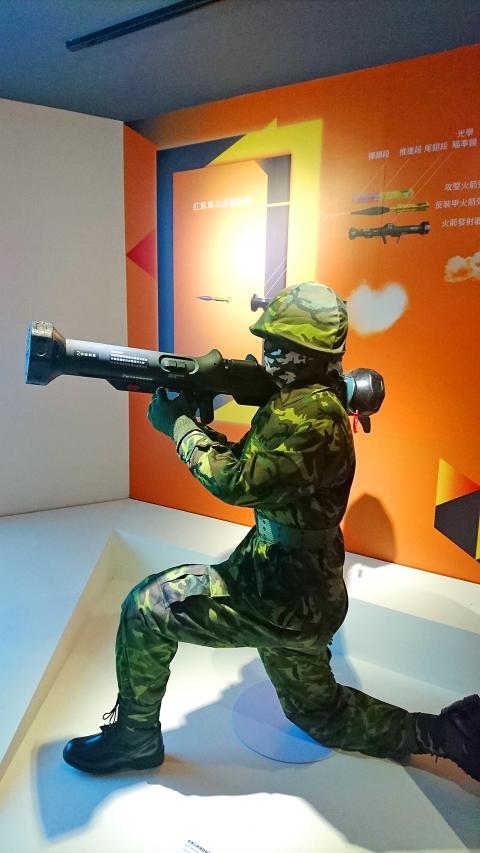The Military Police Command plans to buy 445 indigenously designed Kestrel missile launchers to defend the capital against assaults by China’s People’s Liberation Army (PLA), sources said on Monday.
Purchases would be spread over two years from next year and the missile launchers would be issued to military police units garrisoned in the Taipei metropolitan area, especially those guarding the Boai Special District (博愛特區), which is home to several ministries and other government buildings, they said.
The Kestrel missile launcher is a disposable, single-shot, shoulder-launched weapon system that fires either a high-explosive anti-tank warhead to engage vehicles with light to medium armor, or a high-explosive squash head to use against buildings.

Photo: Lo Tien-pin, Taipei Times
Thus far, the version of the weapon developed by the Chungshan Institute of Science and Technology has only been issued to the marine corps.
The purchase would enable military police to better defend Taipei against decapitation strikes, such as airborne, airmobile or special operations assaults, by the PLA, a defense official said on condition of anonymity.
With the missile launchers, the military police could launch mobile counterattacks in urban combat and retake crucial governmental structures, the official said.
The lightweight weapons could be deployed in high-rises or transported in vehicles, making them difficult to counter in an urban environment, the official added.
To bolster the capital’s defenses, the military has garrisoned an additional marine battalion at the Fuxinggang (復興崗) military base in Taipei and formed the Quick-Reaction Company at the 202nd Military Police Regional Command, the official said.
Asked to comment, the Military Police Command confirmed that it plans to buy the Kestrel missile launchers to defend Taipei.
Anti-armor weapons could engage various hostile vehicles and high-value targets, disrupt tactical formations, sap morale, delay troop movements and shatter the enemy’s will to fight, the command said.

HORROR STORIES: One victim recounted not realizing they had been stabbed and seeing people bleeding, while another recalled breaking down in tears after fleeing A man on Friday died after he tried to fight the knife-wielding suspect who went on a stabbing spree near two of Taipei’s busiest metro stations, Taipei Mayor Chiang Wan-an (蔣萬安) said. The 57-year-old man, identified by his family name, Yu (余), encountered the suspect at Exit M7 of Taipei Main Station and immediately tried to stop him, but was fatally wounded and later died, Chiang said, calling the incident “heartbreaking.” Yu’s family would receive at least NT$5 million (US$158,584) in compensation through the Taipei Rapid Transit Corp’s (TRTC) insurance coverage, he said after convening an emergency security response meeting yesterday morning. National

Taiwan has overtaken South Korea this year in per capita income for the first time in 23 years, IMF data showed. Per capita income is a nation’s GDP divided by the total population, used to compare average wealth levels across countries. Taiwan also beat Japan this year on per capita income, after surpassing it for the first time last year, US magazine Newsweek reported yesterday. Across Asia, Taiwan ranked fourth for per capita income at US$37,827 this year due to sustained economic growth, the report said. In the top three spots were Singapore, Macau and Hong Kong, it said. South

PLANNED: The suspect visited the crime scene before the killings, seeking information on how to access the roof, and had extensively researched a 2014 stabbing incident The suspect in a stabbing attack that killed three people and injured 11 in Taipei on Friday had planned the assault and set fires at other locations earlier in the day, law enforcement officials said yesterday. National Police Agency (NPA) Director-General Chang Jung-hsin (張榮興) said the suspect, a 27-year-old man named Chang Wen (張文), began the attacks at 3:40pm, first setting off smoke bombs on a road, damaging cars and motorbikes. Earlier, Chang Wen set fire to a rental room where he was staying on Gongyuan Road in Zhongzheng District (中正), Chang Jung-hsin said. The suspect later threw smoke grenades near two exits

The Forestry and Nature Conservation Agency yesterday launched a gift box to market honey “certified by a Formosan black bear” in appreciation of a beekeeper’s amicable interaction with a honey-thieving bear. Beekeeper Chih Ming-chen (池明鎮) in January inspected his bee farm in Hualien County’s Jhuosi Township (卓溪) and found that more than 20 beehives had been destroyed and many hives were eaten, with bear droppings and paw prints near the destroyed hives, the agency said. Chih returned to the farm to move the remaining beehives away that evening when he encountered a Formosan black bear only 20m away, the agency said. The bear